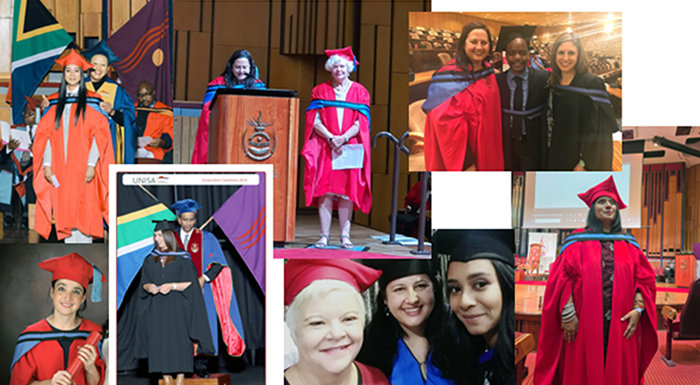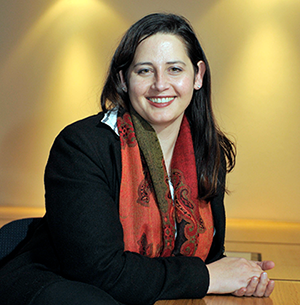
The largest provider of business education in Africa and one of the largest in the world

Some of the recent SAP graduates
In a recent webinar held on 8 October 2025, hosted by Johannes Kepler Universität in Linz, chapter co-authors of "Strategy as Practice in Africa" (in Elgar Encyclopaedia of Strategy as Practice) Prof Annemarie Davis and Dr Charmaine Williamson shared insights as Strategy-as-Practice (SAP) scholars in the Department of Business Management at Unisa and also from their invited contribution to the Elgar Encyclopaedia of SAP in Africa unit.
Their presentation spotlighted the evolution of SAP research in South Africa, with a special focus on how to work within African philosophies as well as the growing community of master’s and doctoral students whose work is contributing to the field.
The webinar was part of the SAP "Around the Globe" initiative, which aims to create awareness and strengthen collaborations with underrepresented regions and initiate global conversations around SAP research. Davis started the webinar by reflecting on how Unisa gained a first-mover advantage in SAP research back in 2008–2009, thanks to Prof Peet Venter’s pioneering efforts at the Unisa Graduate School of Business Leadership. Around the same time, researchers from the University of Pretoria published the first SAP article contextualised within South Africa; followed by an often cited typology matrix offering the next steps in the SAP evolution by Dr Karen Stander and Prof Marius Pretorius (UP).
Since then, SAP has gained traction through various channels, including prescribed textbooks, ongoing collaborations, and recognition in international forums such as the Academy of Management and the Strategic Management Society newsletters in 2018.
In 2014, the Department of Business Management at Unisa formally introduced SAP as a research focus area. The impact is noteworthy. For instance, Dr Lindie Grebe explored the use of strategy tools by Chartered Accountants in the SA mining industry. Two years later, Dr Andani Thakhathi used the SAP perspective to explore the strategising practices of sustainability champions and later completed his PhD in Germany.
Ervine Kekana used the SAP perspective to investigate the rapport between the strategising practices used by top managers and their thinking styles and completed his master’s degree in 2019. Amkela Ngwenya, a master’s graduate from the programme, is now pursuing his PhD at Warwick Business School at the University of Warwick, representing African research interests. Dr Chantelle Govender, another graduate, showcased her work on "pausing as a strategic practice" at the 2023 Academy of Management Conference as part of the Emerging Scholar Program. Dr Junitha Surju (supervised by Prof Violet Moraka) explored strategic alignment in the public sector. At the same time, Dr Nadine de Metz examined how organisations navigate identity and legitimacy during strategic change and subsequently published two papers focusing on her research.
At age 72, Dr Ingrid Vorwerk-Marren completed her doctorate, contributing valuable insights into the resilience of non-profit organisations. Meanwhile, Lungi Xaba whose master’s research focused on middle manager sense-giving and sensemaking, is now investigating the role of emotions in organisational change as part of her doctoral studies.

Prof Annemarie Davis
To date, this vibrant research focus area has produced seven doctoral degrees and fourteen full research master’s degrees – an impressive achievement that speaks to the dedication of both students and supervisors.
Davis’s election as Global Representative-At-Large for the Strategy Practice interest group of the Strategic Management Society in 2024 signals growing recognition for SAP researchers beyond Europe and North America. Dr Catherine le Roux (a former senior lecturer at Unisa who is now with UP) and Grace Magama, a DBL candidate at the Unisa Graduate School of Business, are participating in the SAP mentoring programme by the Academy of Management and the Strategic Management Society.
Williamson’s work with the SAP Interest Group of the Academy of Management saw her invited to share a broad ontological perspective on strategising – emphasising how context, routines and discourse shape strategy, as well as the dynamic interplay between actors and artefacts.
She encouraged participants to engage and re-engage substantively with African researchers, given the diversity of insights and knowledge that Africa ontologically offers. She used various examples, including the now highly topical notions of human-ness, pluralism and connectedness of management science.
Using the case of the Cradle of Humankind, Williamson argued that evidence of now-multiple cradles of humankind takes the globe and scholars back to their own multiple, original, and intertwined ontologies. She then traced this foundational perspective to different management research domains in Africa. She used South African contexts (informal business, business analogies within wildlife), metaphors, and sites to demonstrate the synergies these features have with SAP concepts, given their subjective and manifold ontological theorisations.
The webinar draws on an unfolding research project: to further map SAP research across Africa, Williamson, Davis and Venter conducted an integrative review of SAP papers authored by scholars affiliated with African institutions. They identified 29 papers, with 15 of them linked to Unisa – a testament to the university’s growing influence in the field.
These collective efforts are helping to diversify and deepen SAP theory, bringing in perspectives from contexts that have long been overlooked in global strategy research. It is a powerful reminder that strategic management is not just a global discipline – it is a locally grounded practice, enriched by voices from every corner of the world.
* By Prof Annemarie Davis, Department of Business Management
Publish date: 2025-11-14 00:00:00.0